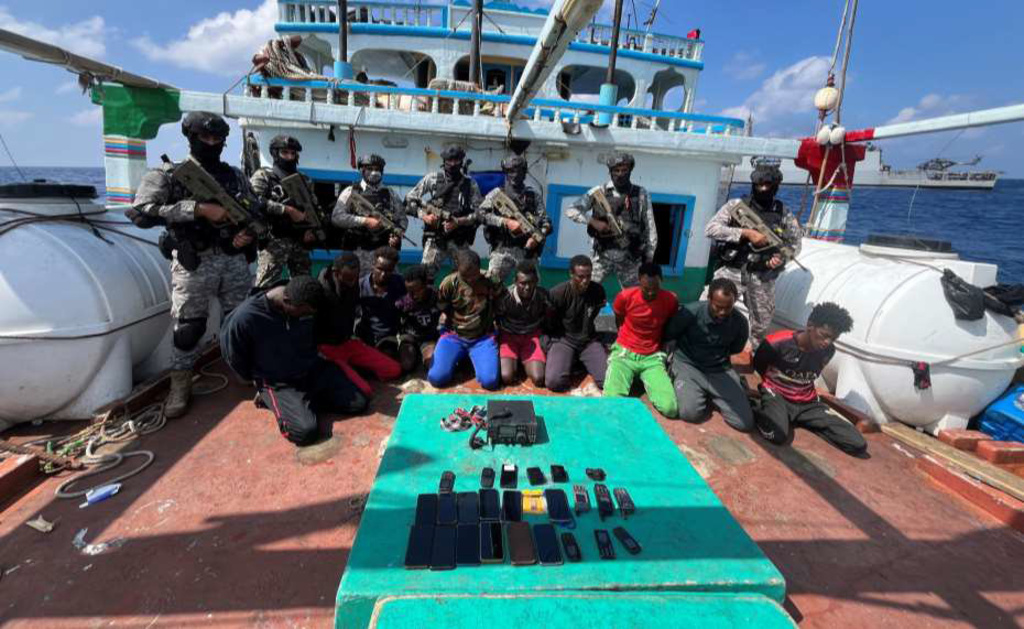ADF STAFF
After a six-year lull in major attacks, Somali pirates in December attacked four vessels as international navies relocated from the Indian Ocean to the Red Sea, where they protect maritime traffic from attacks by Yemen’s Houthi rebels.
Some observers believe al-Shabaab militants in Somalia’s northern Sanaag region reached a deal to provide protection to pirates in exchange for 30% of all ransom proceeds and a cut of any loot, Emirati newspaper The National reported.
The deal could provide al-Shabaab with critical funds after the Somali government clamped down on its other illegal money sources and froze its bank accounts. The terrorists also are suspected of negotiating with pirates and Houthi rebels to acquire weapons.
Somali pirates on December 14 attacked the Maltese-flagged cargo ship MV Ruen about 680 nautical miles east of Bosaso, Somalia. It was the first successful attack by Somali pirates on a merchant ship since 2017.
“No figure has been confirmed yet but pirates are demanding that as part of the deal they promise not to harm the crew on condition that once they receive their ransom they be allowed to walk Scot-free and should not be attacked or arrested,” Ahmed Mohamed, described as a “close ally” of the pirates, told The National, a news service reporting on the Middle East.
Witnesses in Bareeda, a town on the Red Sea coast, told the Somali newspaper Horn Observer that the MV Ruen was held about 100 miles offshore. Somali authorities believe the pirates used an Iranian fishing vessel for the hijacking. Mohamed said the pirates were looking for more ships to hijack.
“The second dhow that was recently hijacked near Eyl is currently being used by the pirates to hunt for other ships,” he told The National.
The pirates are particularly active off the coastal town of Eyl in Somalia’s semiautonomous Puntland region, which al-Shabaab controls.
Heavily armed Somali pirates in late December hijacked another vessel near Yemen’s Socotra Island. Somali security officials reported that the pirates then steered the vessel toward Eyl. Abdiqani Diriye, a Puntland security officer, said the criminals had established control over coastal areas through a collaboration with arms dealers.
“The pirates have grown more formidable than ever before,” Diriye told the Horn Observer. “The source of funding for their new weapons remains uncertain, but there are suspicions that it could involve financial backing from terrorist groups such as Al-Shabaab or ISIS.”
Al-Shabaab had dislodged a small group of rival Islamic State group fighters from Eyl shortly before the Yemen hijacking.
The Indian Navy on January 4 rescued 21 crew members aboard the Liberian-flagged merchant vessel MV Lila Norfolk that pirates hijacked east of Eyl the day before, the BBC reported. The crew said five or six armed men attacked the vessel.
On January 29, the Indian Navy arrested 10 pirates who attacked an Iranian fishing vessel and abducted its 17 crew members off Somalia’s east coast.
Piracy reached its peak in Somalia in 2011 when Somali pirates launched 212 attacks, but only five attacks were recorded between 2017 and 2020. The lull was attributed to coordinated anti-piracy naval operations, safety measures such as armed guards on ships, and increased prosecution and imprisonment of pirates.
Authorities also have recorded a slight increase in piracy in the Gulf of Guinea, where 22 incidents were reported in 2023, compared to 19 in 2022, 35 in 2021, and 81 in 2020, according to the International Maritime Bureau.

